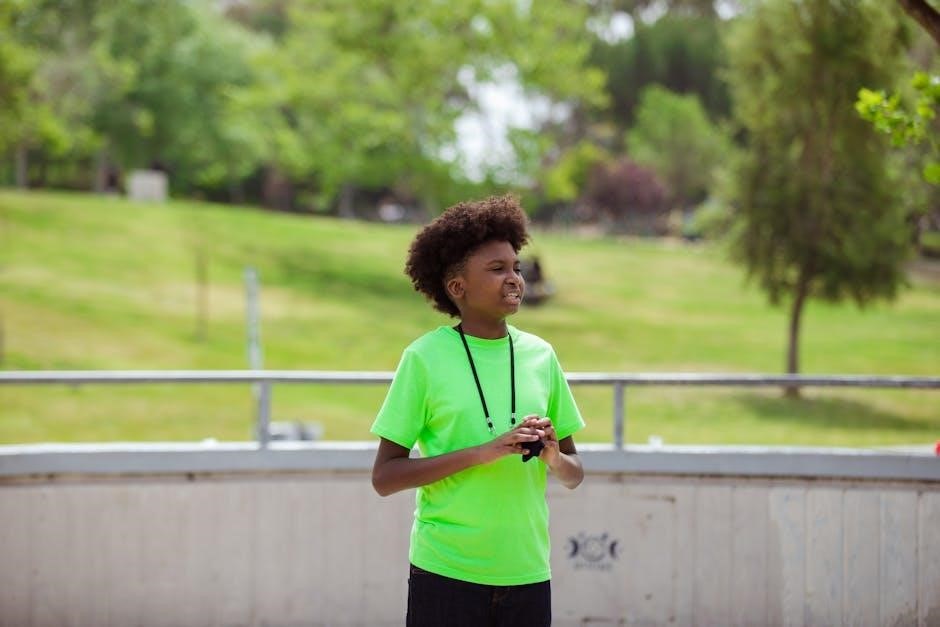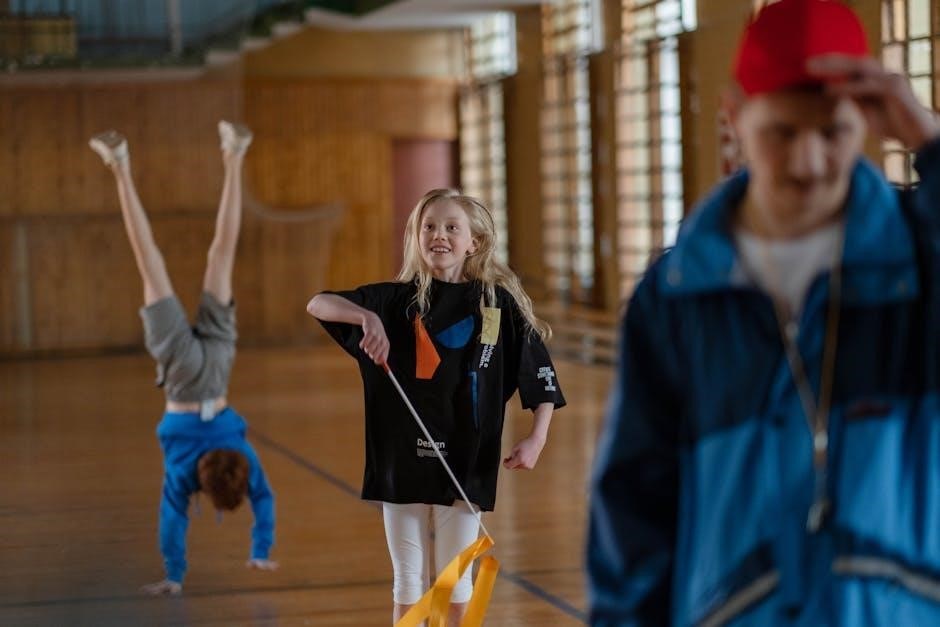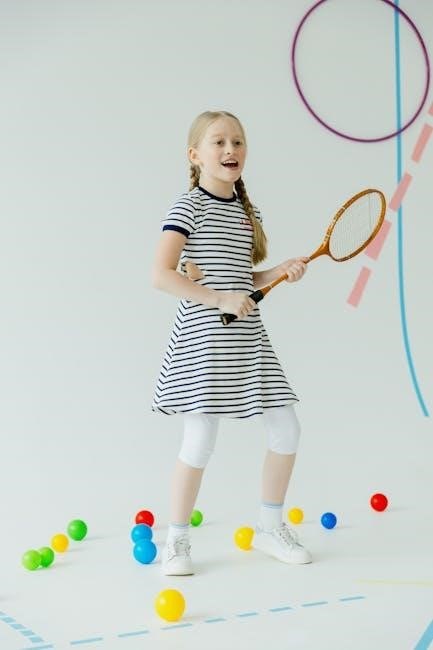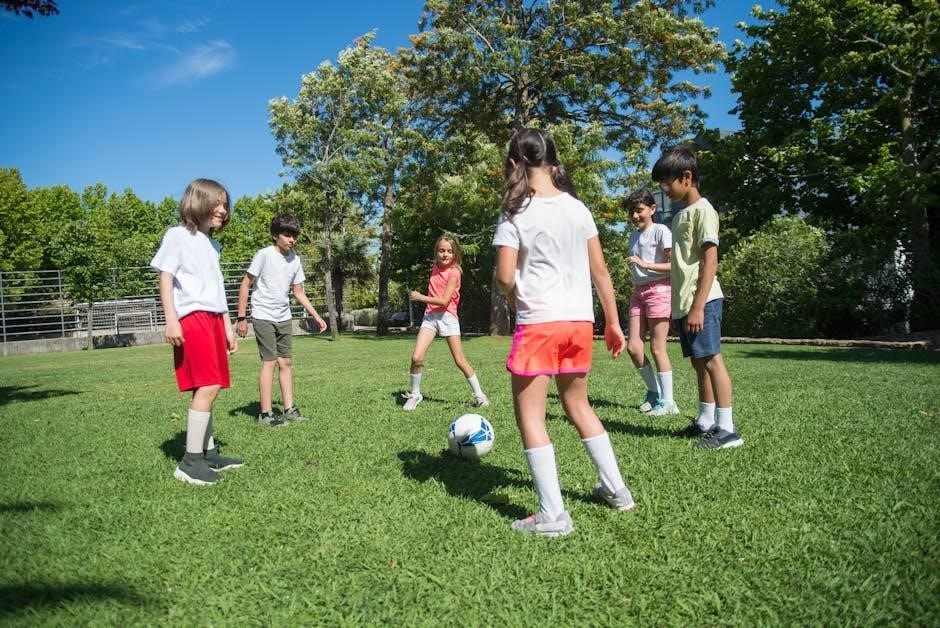
Mental health games and activities offer a fun‚ accessible way to enhance mood and cognitive function․ They provide interactive tools for building resilience‚ empathy‚ and emotional awareness․
1․1 Importance of Playful Interaction in Mental Health
Playful interaction plays a vital role in mental health by fostering connections and reducing stigma․ It creates a non-intimidating environment for discussing emotions and coping strategies‚ making mental health discussions more approachable․ Activities like games and art therapy encourage self-expression‚ stress relief‚ and joy‚ promoting overall well-being․ Playful engagement is accessible to all ages‚ making it a powerful tool for enhancing mental health in a fun and inclusive way․
1․2 Benefits of Mental Health Games for Well-Being
Mental health games enhance mood‚ cognitive function‚ and emotional regulation․ They provide accessible tools for stress relief‚ fostering resilience and joy․ Games like CogniFit and apps such as Headspace offer engaging ways to improve focus and mindfulness․ These activities are suitable for all ages‚ making mental health support fun‚ interactive‚ and effective for overall well-being․
Games and Activities for Children
Engaging mental health games for kids foster emotional literacy and resilience․ Activities like Sesame Street’s “Finding Clues to Name Our Big Feelings” and “Hugs All Around!” promote joy and understanding․
2;1 Age-Appropriate Mental Health Games for Kids
Age-appropriate mental health games for children include activities like “Finding Clues to Name Our Big Feelings” and “Hugs All Around!” from Sesame Street․ These games help kids identify and manage emotions‚ fostering emotional literacy and resilience․ They are designed to be engaging‚ fun‚ and adaptable for different age groups‚ making mental health discussions accessible and stress-free for young minds;
2․2 Examples of Fun Activities from Sesame Street
Sesame Street offers engaging activities like “Finding Clues to Name Our Big Feelings” and “Hugs All Around!” These games help children identify emotions‚ fostering emotional literacy․ “Mindful Moments” encourages relaxation and self-awareness․ These activities are designed to be fun and educational‚ providing kids with tools to express and manage their feelings in a supportive environment‚ making mental health discussions accessible and enjoyable for young learners․

Adult-Focused Mental Health Games
Adults can benefit from games like “Two Truths and a Lie” and “Mood Meter‚” fostering social connections and emotional awareness․ These activities promote mindfulness and self-care․
3․1 Mood Meter and Mindfulness Exercises
Mood Meter helps adults assess and manage emotions‚ fostering self-awareness․ Mindfulness exercises‚ such as deep breathing and meditation‚ promote relaxation and focus․ These activities reduce stress‚ enhance emotional regulation‚ and improve overall well-being․ They can be adapted for individual or group settings‚ making them versatile tools for mental health support․ Regular practice encourages a calm‚ centered mindset and better emotional resilience in daily life․
3․2 Popular Games Like “Two Truths and a Lie”
Games like “Two Truths and a Lie” are engaging icebreakers that foster connection and communication․ Players share two true statements and one false statement about themselves‚ encouraging others to guess the lie․ This activity promotes teamwork‚ empathy‚ and understanding while reducing stress and fostering a positive atmosphere․ It’s a simple yet effective way to build relationships and enhance mental well-being in both personal and professional settings․
Virtual Mental Health Activities
Virtual mental health activities‚ like online bingo and check-ins‚ reduce isolation and foster connections․ They provide accessible‚ engaging ways to support well-being remotely‚ promoting joy and mindfulness․
4․1 Virtual Mental Health Bingo and Check-Ins
Virtual mental health bingo and check-ins are engaging tools for remote well-being․ These activities foster connection and reduce isolation‚ offering a fun way to promote mindfulness and joy․ Participants can join from anywhere‚ making them accessible for diverse groups․ Regular check-ins also encourage consistency in mental health practices‚ creating a supportive community vibe online․
4․2 Online Book Clubs and Game Nights
Online book clubs and game nights provide engaging ways to connect virtually‚ fostering social interaction and mental well-being․ These activities allow participants to share thoughts‚ bond over shared interests‚ and unwind through enjoyable challenges․ They create a sense of community‚ offering support and reducing feelings of isolation while promoting relaxation and joy in a digital space․

Group Therapy Activities
Group therapy activities foster connections‚ encourage teamwork‚ and provide a supportive environment for emotional expression․ They include icebreakers‚ collaborative tasks‚ and creative exercises to promote mental well-being collectively․
5․1 Icebreaker Games for Building Connections
Icebreaker games are essential for fostering initial connections in group settings․ Activities like “Two Truths and a Lie” or “Human Knot” encourage participation‚ helping individuals feel comfortable and build trust․ These games create a relaxed atmosphere‚ making it easier for participants to open up and engage with one another‚ which is crucial for effective group therapy sessions․
5․2 Creative Expression Through Art and Music
Art and music therapy provide powerful outlets for emotional expression․ Activities like painting‚ sculpture‚ or composing music allow individuals to communicate feelings non-verbally․ These creative processes foster self-awareness‚ reduce stress‚ and promote healing․ By engaging in art and music‚ participants can explore their emotions in a safe and constructive manner‚ enhancing their mental well-being and fostering personal growth․

Art and Creative Therapy
Art and creative therapy use activities like painting‚ sculpting‚ or music to promote emotional expression and mental healing․ These tools help reduce stress and enhance self-awareness․
6․1 Mindful Coloring Books for Relaxation
Mindful coloring books are a powerful tool for relaxation‚ reducing anxiety and stress․ They promote focus and calmness‚ allowing individuals to express emotions creatively․ These books often feature intricate designs that distract from negative thoughts‚ fostering a meditative state․ Suitable for both adults and children‚ they are widely used in therapeutic settings to enhance mental well-being and self-awareness through artistic expression․
6․2 Music and Writing Therapy for Emotional Expression
Music and writing therapy serve as powerful outlets for emotional expression‚ helping individuals process feelings and gain insight․ Through journaling or composing‚ participants can articulate emotions‚ fostering self-awareness and healing․ These therapies are widely used in therapeutic settings to promote mental well-being and provide a creative space for personal reflection and growth․
Physical Activities for Mental Health
Physical activities like sports‚ yoga‚ and walking reduce stress‚ boost mood‚ and enhance focus․ Regular movement promotes mental well-being and overall health․
7․1 Sports and Movement-Based Games
Sports and movement-based games are powerful tools for mental health‚ fostering connection and empowerment․ Activities like badminton‚ football‚ or yoga promote physical fitness while reducing stress․ They encourage teamwork‚ focus‚ and emotional release‚ creating a sense of accomplishment․ Movement-based games also boost dopamine levels‚ enhancing mood and energy․ These activities offer a holistic approach to mental well-being‚ combining physical exercise with mental stimulation․
7․2 Outdoor Activities for Mental Well-Being
Outdoor activities‚ such as walking‚ cycling‚ or picnics‚ offer a refreshing way to improve mental health․ Nature exposure reduces stress‚ enhances mood‚ and fosters a sense of calm․ These activities lower the risk of anxiety and depression while promoting physical fitness․ Outdoor engagement provides a holistic approach to well-being‚ boosting self-esteem and encouraging social interaction in a serene environment․

Cognitive Training Games
Cognitive training games‚ like “Mood Garden” and “Calm Bubble‚” enhance memory‚ problem-solving‚ and spatial reasoning․ These interactive tools boost mental agility‚ reducing anxiety and depression risks‚ while fostering emotional well-being through engaging activities tailored for diverse mental health needs․
8․1 Memory and Problem-Solving Games
Memory and problem-solving games‚ such as Sudoku‚ crosswords‚ and “Mood Garden‚” enhance cognitive function and mental agility․ These activities improve concentration‚ reduce stress‚ and boost mood․ They are especially beneficial for seniors‚ as they challenge spatial reasoning and memory‚ keeping the mind sharp and aiding emotional well-being․ Regular engagement in such games can lower anxiety and depression risks․
8․2 App-Based Games Like CogniFit
Apps like CogniFit‚ Happy Habits‚ and Headspace offer interactive mental health exercises․ These tools provide personalized workouts to improve cognitive function and emotional well-being․ They feature memory games‚ mindfulness exercises‚ and mood-tracking tools‚ making mental health support accessible anywhere․ Such apps are ideal for adults and seniors‚ promoting mental agility and reducing stress through engaging‚ self-paced activities․

Relaxation and Mindfulness Exercises
Relaxation and mindfulness exercises‚ like deep belly breathing and virtual meditation‚ reduce stress and anxiety․ These practices promote calm‚ focus‚ and emotional balance‚ enhancing overall well-being․
9․1 Deep Breathing and Meditation Activities
Deep breathing and meditation are powerful tools for relaxation․ These activities reduce stress‚ improve focus‚ and promote emotional balance․ Regular practice enhances mental clarity and overall well-being‚ making them essential for mental health routines․
9․2 Virtual Meditation Sessions
Virtual meditation sessions provide accessible relaxation techniques for individuals and groups․ These sessions often include guided breathing exercises‚ calming visuals‚ and soothing music․ They help reduce stress and improve focus‚ offering a convenient way to practice mindfulness from anywhere‚ making mental well-being more achievable in today’s fast-paced world․
Educational and Psychoeducational Resources
Educational resources‚ such as worksheets and guides‚ provide interactive tools for mental health education‚ fostering self-care and emotional literacy in therapeutic and classroom environments․
10․1 Worksheets and Guides for Mental Health
Worksheets and guides are valuable tools for mental health education‚ offering structured activities to teach self-care‚ emotional literacy‚ and coping strategies․ They provide practical exercises for identifying emotions‚ managing stress‚ and fostering resilience․ These resources are ideal for therapeutic settings‚ classrooms‚ or personal use‚ helping individuals develop a deeper understanding of mental well-being․ Many are free to download and easily adaptable․
10․2 Recommended Tools for Therapeutic Settings
Therapeutic tools like board games‚ art supplies‚ and mindfulness exercises are essential for fostering emotional growth․ Games such as “Mood Meter” and “Two Truths and a Lie” encourage empathy and communication․ Art therapy‚ including coloring books‚ helps reduce stress and express emotions․ These tools create a supportive environment‚ making mental health discussions engaging and accessible for all participants in therapy sessions․
Mental health games and activities are effective tools for fostering joy‚ well-being‚ and emotional growth․ They provide engaging ways to prioritize mental health and break down stigmas․
11․1 The Future of Mental Health Gaming
The future of mental health gaming lies in innovative technologies like VR and AI‚ offering personalized experiences․ Apps and digital tools will continue to expand accessibility‚ making mental health support more engaging and widespread․ These advancements promise to revolutionize how individuals cope with stress‚ build resilience‚ and maintain well-being in a fun and interactive manner․
11․2 Encouraging Joy and Well-Being Through Play
Playful interactions foster joy and emotional well-being by creating a safe space for self-expression and connection․ Activities like art therapy‚ music sessions‚ and interactive games encourage positivity‚ reducing stress and isolation․ By incorporating play into daily routines‚ individuals can cultivate resilience and happiness‚ promoting a healthier mindset and stronger relationships in both personal and community settings․